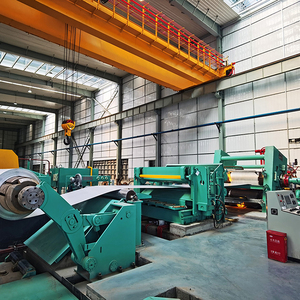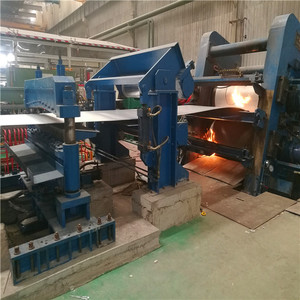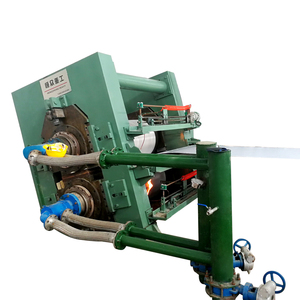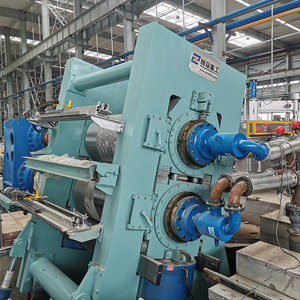
All categories
Featured selections
Trade Assurance
Buyer Central
Help Center
Get the app
Become a supplier

(355 products available)














In the realm of industrial machinery, centrifugal casting rolling mill rolls hold a significant role in the processing and shaping of metals. These machines are integral to the metallurgy sector, providing the capability to transform raw materials into usable metal sheets or structural components. centrifugal casting rolling mill rolls are designed to exert high pressure and heat, which is essential for altering the properties of metals, enhancing their strength, and ensuring precise dimensions. They are widely utilized in various industries, including automotive, construction, and manufacturing, due to their efficiency and reliability. Understanding the intricacies of centrifugal casting rolling mill rolls is crucial for optimizing their use in industrial applications.
There are several types of centrifugal casting rolling mill rolls available to cater to different industrial needs. The most common types include two-high mills, three-high mills, four-high mills, and cluster mills. Two-high mills are the simplest, consisting of two opposing rolls that exert force on the metal. Three-high mills add a third roll, allowing for continuous rolling without reversing the direction. Four-high mills increase precision by utilizing smaller working rolls supported by larger backup rolls. Cluster mills, with multiple rolls, provide enhanced control over complex shapes and thin materials. Each type of centrifugal casting rolling mill rolls serves specific purposes, ensuring optimal performance in various metallurgical processes.
The primary function of centrifugal casting rolling mill rolls is to reduce the thickness of metal sheets while maintaining uniformity and enhancing mechanical properties. These machines feature advanced control systems for precise regulation of speed, pressure, and temperature during the rolling process. Essential features include hydraulic systems for roll adjustment, automatic lubrication systems for maintenance, and computerized controls for monitoring and adjustments. The versatility of centrifugal casting rolling mill rolls allows for the production of metal sheets with specific surface finishes, textures, and dimensions, accommodating diverse requirements in the industry. Their robust construction ensures durability and efficiency, making them indispensable in metal processing.
centrifugal casting rolling mill rolls are capable of processing a wide range of materials, including steel, aluminum, copper, and other alloys. Steel is the most common material processed, ideal for structural applications due to its strength and versatility. Aluminum, known for its lightweight and corrosion resistance, is frequently used in the aerospace and automotive sectors. Copper, with excellent conductivity, is processed for electrical applications. The choice of material impacts the design and operation of centrifugal casting rolling mill rolls, requiring adjustments in pressure, temperature, and speed. Advanced models are equipped to handle high-strength alloys, meeting the demands of modern industries.
Proper maintenance is crucial for the longevity and performance of centrifugal casting rolling mill rolls. Regular inspections and servicing are necessary to ensure the integrity of components such as rolls, bearings, and hydraulic systems. Timely lubrication and cleaning prevent wear and enhance efficiency. Optimization involves adjusting operational parameters to maximize output and quality. Modern centrifugal casting rolling mill rolls are equipped with diagnostic tools to monitor performance and predict maintenance needs, reducing downtime. Training operators to understand the nuances of these machines further enhances productivity and safety. Emphasizing maintenance and optimization ensures that centrifugal casting rolling mill rolls continue to meet the evolving demands of the industry.
Choosing the right centrifugal casting rolling mill rolls for industrial applications requires a thorough understanding of specific operational needs and material requirements. One must consider the type of material being processed, as different metals have distinct characteristics that affect the rolling process. For instance, steel requires a robust rolling mill capable of handling high pressure, while aluminum needs a machine that offers precision and temperature control. Additionally, the production volume and desired thickness of the metal sheets play a crucial role in selecting the appropriate centrifugal casting rolling mill rolls. Evaluating these factors ensures that the machine aligns with the operational demands and enhances productivity.
Another critical aspect is the configuration of the centrifugal casting rolling mill rolls. Depending on the application's complexity, businesses may opt for a two-high, three-high, or four-high mill. Two-high mills are suitable for simpler tasks, while four-high mills offer greater control and precision for more intricate processes. The level of automation is also a factor, with advanced models featuring computerized controls for real-time monitoring and adjustments. It is essential to balance the desired level of automation with the available budget and workforce capabilities to ensure optimal performance and efficiency.
When selecting centrifugal casting rolling mill rolls for specific materials, it is vital to consider the material's properties, such as hardness, ductility, and thermal conductivity. These factors influence the design and operation of the rolling mill, requiring adjustments in pressure, roll diameter, and temperature control. Understanding the material's characteristics ensures the machine is equipped to handle the processing requirements effectively.
Automation significantly impacts the efficiency of centrifugal casting rolling mill rolls by providing precise control over operational parameters such as speed, pressure, and temperature. Automated systems reduce human error, enhance consistency, and allow for real-time adjustments based on material feedback. This leads to improved output quality and reduced downtime, optimizing the overall production process.
Yes, centrifugal casting rolling mill rolls can be customized to meet specific industrial applications. Customization options include modifications to roll diameter, material handling features, and control systems. These adjustments ensure the machine is tailored to the unique requirements of the application, enhancing performance and efficiency in processing different materials.
Maintenance of centrifugal casting rolling mill rolls involves regular inspections, lubrication, and cleaning to ensure the integrity of components such as rolls and bearings. Scheduled servicing prevents wear and tear, enhancing the machine's longevity and efficiency. Utilizing diagnostic tools for performance monitoring can also predict maintenance needs, minimizing downtime and ensuring continuous operation.
centrifugal casting rolling mill rolls enhance the quality of metal sheets by providing precise control over thickness, surface finish, and texture. Advanced models with computerized controls allow for detailed adjustments during the rolling process, ensuring uniformity and improved mechanical properties. This capability is crucial for meeting industry standards and customer specifications.